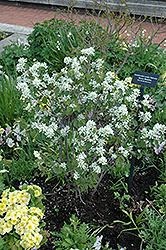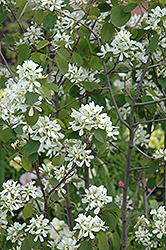Helvetica Serviceberry
Amelanchier ovalis 'Helvetica'
Height: 5 feet
Spread: 5 feet
Sunlight:
![]()
![]()
Hardiness Zone: 4
Other Names: Juneberry, Shadbush, Snowy Mespilus
Description:
A dense and compact garden shrub with branches smothered in clusters of pretty star-shaped white flowers in spring; dark red berries are loved by the birds
Ornamental Features
Helvetica Serviceberry is primarily grown for its highly ornamental fruit. It features an abundance of magnificent deep purple berries from late spring to early summer. It is blanketed in stunning racemes of creamy white flowers rising above the foliage from mid to late spring before the leaves. It has dark green deciduous foliage which emerges red in spring. The oval leaves turn an outstanding yellow in the fall.
Landscape Attributes
Helvetica Serviceberry is a dense multi-stemmed deciduous shrub with a more or less rounded form. Its average texture blends into the landscape, but can be balanced by one or two finer or coarser trees or shrubs for an effective composition.
This is a relatively low maintenance shrub, and is best pruned in late winter once the threat of extreme cold has passed. It is a good choice for attracting birds to your yard, but is not particularly attractive to deer who tend to leave it alone in favor of tastier treats. It has no significant negative characteristics.
Helvetica Serviceberry is recommended for the following landscape applications;
- Mass Planting
- Hedges/Screening
- General Garden Use
- Naturalizing And Woodland Gardens
Planting & Growing
Helvetica Serviceberry will grow to be about 5 feet tall at maturity, with a spread of 5 feet. It tends to fill out right to the ground and therefore doesn't necessarily require facer plants in front, and is suitable for planting under power lines. It grows at a medium rate, and under ideal conditions can be expected to live for approximately 30 years. This is a self-pollinating variety, so it doesn't require a second plant nearby to set fruit.
This shrub does best in full sun to partial shade. It prefers to grow in average to moist conditions, and shouldn't be allowed to dry out. It is not particular as to soil type or pH. It is somewhat tolerant of urban pollution. This is a selection of a native North American species.

